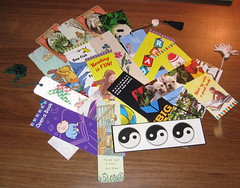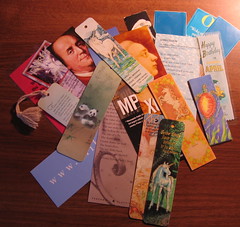Reading Emerson's essay The Over-Soul in light of Margaret Atwood's interview on Faith and Reason last night allowed me a whole new approach. Atwood calls herself a strict agnostic. To her that means the only thing that can be called knowledge is something that can be proven, everything else is belief. Because God cannot be proved or disproved, God is belief. Moyers asked her if she could get rid of that thing in humans that desires a god, would she? She, in an apparent avoidance of the question, started talking about Yann Martel's novel The Life of Pi (wonderful book if you haven't read it). She said at the end the insurance investigators tell Pi that his story could not have happened. Pi says to them that it didn't matter if they believed him or not, what he wants to know is do they like his story better with or without the tiger. The investigators decide they like the tiger story better. Moyers asked Atwood if she believed in the soul. Her answer was that she likes the story with the tiger in it better.
What does any of this have to do with Emerson? Instead of feeling like I am battling with The Mind of Emerson, I read the essay as a story Emerson is telling about the soul. Turns out, it's a pretty good story; a radical story that even today people who call themselves Christians would have problems with. In case you don't know it, let me see if I can sum it up.
There's this over-soul which is pretty much God's soul, and everything is part of the over-soul. Everyone and everything has the over-soul within it. As humans, all we see are pieces of the world. Because we cannot see the whole, we make the mistake of believing the pieces are It. But they are not. Everything funnels back to the over-soul which unites all the pieces:
We live in succession, in division, in parts, in particles. Meantime within man is the soul of the whole; the wise silence; the universal beauty, to which every part and particle is equally related; the eternal ONE.
And here Emerson becomes very similar to eastern religions. Because the soul is timeless, there is no past or future, only now. Instead of waiting for our reward in heaven when we die, we can have it now. To get it, all we have to do is submit our will to the soul, our individual soul, which is also the over-soul. When we do that we reach a sort of nirvana where we can see the whole instead of the pieces:
Ineffable is the union of man and God in every act of the soul. The simplest person who in his integrity worships God, becomes God.
That is a pretty darn good story. What makes it even better is that it appeals to both the individual sense and the communal sense. The individual is to follow no authority, but find his way to God on his own; a very Protestant, personal relationship with God. But in uniting with God in the over-soul we lose ourselves as individuals:
The heart in thee is the heart in all; not a valve, not a wall, not an intersection is there anywhere in nature, but one blood rolls uninterruptedly an endless circulation through all men, as the water of the globe is all one sea, and, truly seen, its tide is one.
Because of this unity, everyone, no matter race, class, or gender, is part of the whole. Hurt yourself, you hurt everyone; hurt someone else, you hurt yourself too.
A good version of the story that we as humans have been telling and retelling probably since we learned how to tell stories. Emerson's story isn't perfect. There are things in it that I don't like such as the exclusion of women. But since it is a story, I, we, have the power to revise it. And while I would put myself in the agnostic camp with Margaret Atwood, I too, like the story with the tiger in it better.
Next week's Emerson:
Circles



